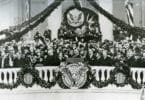As we continue our Pillars of Power series, we reach Lyndon B. Johnson, a president whose legacy is defined by landmark achievements and profound controversies. Rising unexpectedly to the presidency following John F. Kennedy’s assassination, Johnson led the nation through an era of sweeping social reforms and escalating conflicts. This article explores Johnson’s family roots, his strengths and limitations as a leader, and the lasting mark he left on the nation.
Family Background: The Johnson Legacy
Lyndon Baines Johnson was born on August 27, 1908, in a small farmhouse near Stonewall, Texas. His family, while not wealthy, had deep Texas roots. His father, Samuel Ealy Johnson Jr., was a farmer and politician who served five terms in the Texas House of Representatives. Johnson’s mother, Rebekah Baines Johnson, came from a respected family and instilled in him a strong work ethic and sense of ambition.
Johnson’s upbringing in the Texas Hill Country shaped his personality and values. He learned about hard work and rural life, but he also saw the struggles of poor farmers and laborers—a perspective that would later fuel his commitment to social reform. His family’s involvement in politics gave him an early sense of civic duty, and he knew from a young age that he wanted to make a difference on a national scale.
Political Ascent and Family Life
After graduating from Southwest Texas State Teachers College, Johnson began a teaching career, working with underprivileged students in Cotulla, Texas. This experience deepened his understanding of poverty and inequality, strengthening his resolve to pursue public service. In 1934, Johnson married Claudia Alta Taylor, better known as “Lady Bird.” Lady Bird was a supportive partner who shared Johnson’s dedication to public service, and her charm and intelligence made her an admired first lady.
Johnson’s political career began in earnest in 1937 when he was elected to the U.S. House of Representatives. Over the years, he climbed the political ladder, becoming a senator, Senate Majority Leader, and eventually vice president under John F. Kennedy. Known for his intense energy and determination, Johnson was a master of political negotiation, often using his famous “Johnson treatment”—a mix of persuasion and pressure—to sway colleagues. This skill would prove essential in his later accomplishments as president.
Strengths of Johnson’s Presidency
When Johnson assumed the presidency in 1963, he faced the dual challenge of continuing Kennedy’s legacy while building his own. Let’s explore Johnson’s strengths as a leader:
• The Great Society: Johnson’s most ambitious vision was his “Great Society” program, a series of legislative initiatives to eliminate poverty and racial injustice. Under his leadership, Congress passed the Economic Opportunity Act, which created programs like Job Corps, Head Start, and Medicare. These programs fundamentally reshaped the social fabric of America, providing support for education, healthcare, and employment that benefited millions of Americans.
• Civil Rights Legislation: Johnson’s commitment to civil rights was one of his defining legacies. In 1964, he signed the Civil Rights Act, which outlawed segregation and discrimination based on race, color, religion, sex, or national origin. The following year, he signed the Voting Rights Act, a landmark law to overcome racial barriers to voting. Johnson’s support for civil rights earned him admiration but also sparked resistance, especially in the South.
• Medicare and Medicaid: In 1965, Johnson oversaw the establishment of Medicare and Medicaid, two programs that transformed healthcare in America. Medicare provided health insurance for elderly Americans, while Medicaid offered coverage for low-income individuals and families. These programs represented a major shift toward federal involvement in healthcare, setting a precedent that continues to impact millions of Americans.
• Education Reform: Johnson’s personal experience as a teacher influenced his commitment to improving education. He signed the Elementary and Secondary Education Act of 1965, which provided federal funding to support low-income schools and improve educational access. This law marked the first significant federal investment in public education and remains a cornerstone of U.S. educational policy.
Limitations of Johnson’s Presidency
Despite his achievements, Johnson’s presidency was marred by significant challenges and controversies. Here’s a look at the limitations he faced:
• The Vietnam War: The Vietnam War became Johnson’s greatest struggle and ultimately overshadowed his domestic accomplishments. Committed to stopping the spread of communism, Johnson escalated U.S. involvement in Vietnam, increasing troop deployments and funding. However, the war became increasingly unpopular as American casualties mounted, and protests erupted across the country. Johnson’s inability to secure a clear victory or an exit strategy led to widespread criticism, and he left office with his popularity severely diminished.
• Social and Political Division: Johnson’s push for civil rights and social reforms sparked backlash, especially in the South. Many Americans resisted the changes he advocated, and his presidency saw a growing divide between conservative and progressive factions. This polarization, coupled with opposition to the Vietnam War, contributed to social unrest and set the stage for the political turbulence of the late 1960s.
• Economic Strain: Johnson’s ambitious Great Society programs, combined with the financial demands of the Vietnam War, put considerable strain on the U.S. economy. As inflation began to rise, critics argued that Johnson’s spending priorities were unsustainable. The economic challenges of his administration would later influence debates over government spending and welfare programs.
• Environmental Neglect: Johnson’s presidency brought significant social reform but lacked a strong focus on environmental issues. The environmental movement began gaining traction in the 1960s, and Johnson’s administration made little progress in addressing pollution or conservation.
Life After the Presidency and Family Legacy
In 1968, Johnson chose not to seek re-election, recognizing the toll of the Vietnam War on his popularity and the nation. He returned to his ranch in Stonewall, Texas, where he spent his remaining years reflecting on his presidency and writing his memoirs. Johnson passed away on January 22, 1973, leaving behind a complex legacy defined by groundbreaking social reforms and a deeply divisive war.
The Johnson family’s legacy continues through the Lyndon B. Johnson Foundation and the LBJ Presidential Library, both promoting research and education on his life and policies. Lady Bird Johnson became a notable advocate for environmental conservation, adding to the family’s contributions to public service.
Legacy: Strengths and Limitations in Perspective
Lyndon B. Johnson’s presidency is remembered for its transformative impact on American society, from civil rights to healthcare to education. His Great Society initiatives expanded the role of government in addressing social issues, creating programs that endure to this day. However, the shadow of the Vietnam War and the divisions it created cast a complex light on his legacy.
While his domestic achievements advanced American progress, Johnson’s limitations and the controversies surrounding the Vietnam War highlighted the challenges of balancing ambitious policy with international conflict. Today, Johnson remains a figure who evokes both admiration and critique—a leader whose vision for a “Great Society” continues to inspire debate on the role of government in shaping American life.
To gain a deeper understanding of Lyndon B. Johnson’s life, presidency, and enduring impact, consider the following insightful books:
Authored by Robert A. Caro, this is the first volume in his acclaimed series, ‘The Years of Lyndon Johnson.’ It provides an in-depth exploration of Johnson’s early life, ascent in Texas politics, and relentless pursuit of power. Caro’s meticulous research comprehensively examines the forces that shaped Johnson’s character and ambitions.
Lyndon B. Johnson: Portrait of a President
Written by Robert Dallek, this biography offers a balanced examination of Johnson’s presidency, highlighting his significant achievements and the controversies that marked his tenure. Dallek delves into Johnson’s domestic policies, including the Great Society programs, and his foreign policy challenges, particularly the Vietnam War.
The Triumph & Tragedy of Lyndon Johnson
Joseph A. Califano Jr., who served as Johnson’s top domestic aide, provides an insider’s perspective on the complexities of Johnson’s leadership. This memoir offers unique insights into Johnson’s decision-making processes, his legislative strategies, and the personal dynamics within his administration.
Lyndon Johnson and the American Dream
Doris Kearns Goodwin presents a compelling narrative that combines biography with psychological analysis. Drawing from her personal conversations with Johnson, Goodwin explores his ambitions, insecurities, and the driving forces behind his policies, providing a nuanced portrait of his complex personality.
Flawed Giant: Lyndon Johnson and His Times, 1961-1973
Also, Robert Dallek’s work focuses on the latter part of Johnson’s career, covering his vice presidency, presidency, and post-presidential years. Dallek offers a detailed analysis of Johnson’s legislative successes, his handling of the Vietnam War, and the personal struggles that defined his final years in office.






